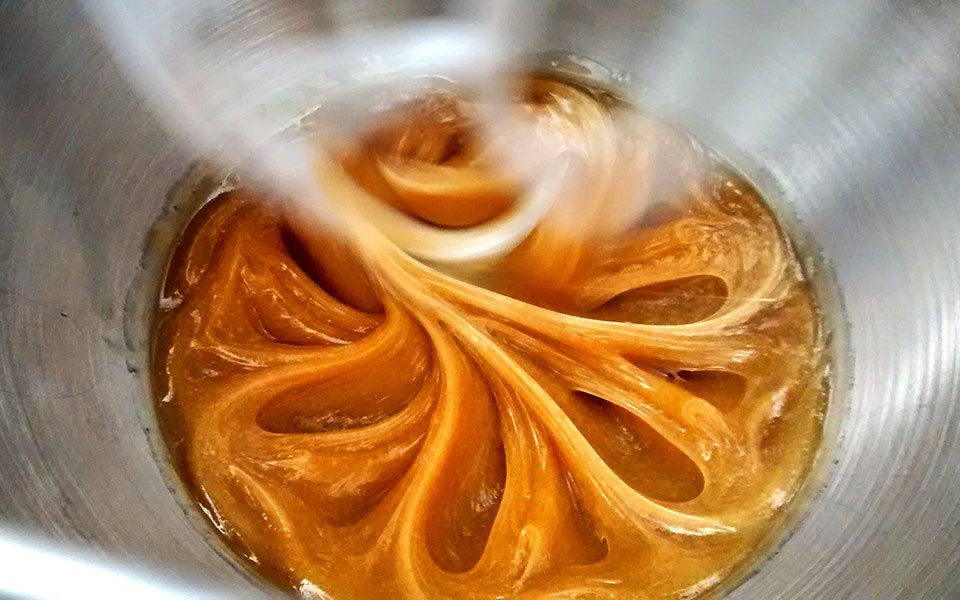Caramelización para Cocineros
DOI:
https://doi.org/10.70221/rgc.7471112.divPalabras clave:
Divulgación, Azúcar, Caramelización, CocinaResumen
Este artículo de divulgación trata sobre la caramelización, que es uno de los conceptos de ciencia de alimentos que los profesionales culinarios deberíamos comprender. Consiste en la descomposición térmica del azúcar que forma una amplia gama de compuestos de aroma, sabor, color, y también con actividad biológica. No es lo mismo caramelizar sacarosa (azúcar de mesa) que fructosa, glucosa, lactosa u otros azúcares. La caramelización y la fusión aparente (irreversible) del azúcar son procesos distintos, y según la naturaleza del azúcar y las condiciones culinarias podemos acceder sólo a uno de ellos o a ambos.
Descargas
Referencias
Asociación de Chefs del Ecuador. (2018). Guía de Técnicas Culinarias. CANVAS. https://bit.ly/gtc_2018
Bertrand, P. (2017). Bubble Sugar Decorations. Meilleur Du Chef. https://www.meilleurduchef.com/en/recipe/bubble-sugar.html
Buera, M. del P., Chirife, J., Resnik, S. L., & Lozano, R. D. (1987). Nonenzymatic Browning in Liquid Model Systems of High Water Activity: Kinetics of Color Changes due to Caramelization of Various Single Sugars. Journal of Food Science, 52(4), 1059–1062. https://doi.org/10.1111/j.1365-2621.1987.tb14275.x
Burke, R. M., Kelly, A. L., Lavelle, C., & Kientza, H. T. vo (Eds.). (2021). Handbook of Molecular Gastronomy: Scientific Foundations, Educational Practices, and Culinary Applications (1a ed.). CRC Press. https://doi.org/10.1201/9780429168703
Cordeiro, G., Amouyal, O., Eliott, F., & Henry, R. (2007). Sugarcane. En C. Kole (Ed.), Pulses, Sugar and Tuber Crops (Vol. 3, pp. 175–203). Springer Berlin Heidelberg. https://doi.org/10.1007/978-3-540-34516-9_11
Culinary Institute of America (Ed.). (2011). The professional chef (9th ed). John Wiley & Sons.
Escoffier, A. (1907). A Guide to Modern Cookery. William Heinemann.
Kitaoka, S., & Suzuki, K. (1967). Caramels and Caramelization: Part I. The Nature of Caramelan. Agricultural and Biological Chemistry, 31(6), 753–755. https://doi.org/10.1080/00021369.1967.10858875
Li, T.-X., Ji, L.-B., Jiang, Z.-R., Geng, Z.-Z., Shentu, H.-Q., Liu, M.-C., Xie, Y.-F., Hu, J., Liu, Y.-F., & Li, D.-L. (2020). Caramel products of glucose with water during heating process and their bioactivities. International Journal of Food Properties, 23(1), 971–978. https://doi.org/10.1080/10942912.2020.1770788
Myhrvold, N., Young, C., & Bilet, M. (2011). Modernist Cuisine: El arte y la ciencia de la cocina / The Art and Science of Cooking. Cooking Lab.
Paravisini, L., Moretton, C., Gouttefangeas, C., Nigay, H., Dacremont, C., & Guichard, E. (2017). Caramel flavour perception: Impact of the non-volatile compounds on sensory properties and in-vitro aroma release. Food Research International, 100, 209–215. https://doi.org/10.1016/j.foodres.2017.07.003
Parks, S. (2022). Toasted Sugar Recipe. Serious Eats. https://www.seriouseats.com/dry-toasted-sugar-granulated-caramel-recipe
Sengar, G., & Sharma, H. K. (2014). Food caramels: A review. Journal of Food Science and Technology, 51(9), 1686–1696. https://doi.org/10.1007/s13197-012-0633-z
Suárez-Pereira, E., Rubio, E. M., Pilard, S., Ortiz Mellet, C., & García Fernández, J. M. (2010). Di- D -fructose Dianhydride-Enriched Products by Acid Ion-Exchange Resin-Promoted Caramelization of D -Fructose: Chemical Analyses. Journal of Agricultural and Food Chemistry, 58(3), 1777–1787. https://doi.org/10.1021/jf903354y
Tomasik, P., Pałasiński, M., & Wiejak, S. (1989). The Thermal Decomposition of Carbohydrates. Part I. The Decomposition of Mono-, Di-, and Oligo-Saccharides. En Advances in Carbohydrate Chemistry and Biochemistry (Vol. 47, pp. 203–278). Elsevier. https://doi.org/10.1016/S0065-2318(08)60415-1

Publicado
Licencia
Derechos de autor 2022 Rodrigo Duarte

Esta obra está bajo una licencia internacional Creative Commons Atribución 4.0.
Usted es libre de:
Compartir — copiar y redistribuir el material en cualquier medio o formato
Adaptar — remezclar, transformar y construir a partir del material, para cualquier propósito, incluso comercialmente. La licenciante no puede revocar estas libertades en tanto usted siga los términos de la licencia
Bajo los siguientes términos:
Atribución — Usted debe dar crédito de manera adecuada, brindar un enlace a la licencia, e indicar si se han realizado cambios. Puede hacerlo en cualquier forma razonable, pero no de forma tal que sugiera que usted o su uso tienen el apoyo de la licenciante.
No hay restricciones adicionales — No puede aplicar términos legales ni medidas tecnológicas que restrinjan legalmente a otras a hacer cualquier uso permitido por la licencia.














